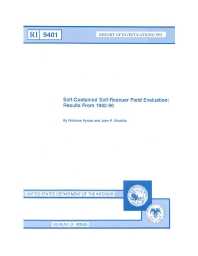Mining Publication: Self-Contained Self-Rescuer Field Evaluation: Results From 1982-90
Original creation date: January 1992
A joint effort by the U.S. Bureau of Mines and the U.S. Mine Safety and Health Administration (MSHA) was undertaken to determine how well self-contained self-rescuers (SCSR's), deployed in accordance with Federal regulations (30 CFR 75.1714), survived the underground environment with regard to both impact damage and aging. This report presents findings regarding laboratory-tested SCSR's from 1982 through 1990. The SCSR's were tested on human subjects and on a breathing and metabolic simulator. These results indicate that most of the apparatus, if they pass their inspection criteria, perform as expected except for units with manufacturing defects or design deficiencies. However, when the apparatus are carried in and out of the mine daily and stored at the working section, they may suffer abuse. Physical signs of abuse, unless extremely obvious, are frequently not detected by the miners or mine operators. This poses a potential danger to a user in an emergency. Recommendations include improved training in inspection procedures.
Authors: N Kyriazi, JP Shubilla
Report of Investigations - January 1992
NIOSHTIC2 Number: 10011184
U.S. Department of the Interior, Bureau of Mines, Report of Investigations 9401, 1992 Jan:1-18
See Also
- How to Operate a Refuge Chamber: A Quick Start Guide
- I Can't Get Enough Air! Proper Self-contained Self-rescuer Usage
- Probability of Making a Successful Mine Escape While Wearing a Self-Contained Self-Rescuer
- Refuge Chamber Expectations Training - 1.0
- Self-Contained Self-Rescuer Field Evaluation: Fifth-Phase Results
- Self-Contained Self-Rescuer Field Evaluation: First-Year Results of 5-Year Study
- Self-Contained Self-Rescuer Field Evaluation: Fourth-Phase Results
- Self-Contained Self-Rescuer Field Evaluation: Seventh-Phase Results
- Self-Contained Self-Rescuer Field Evaluation: Sixth-Phase Results
- Self-Contained Self-Rescuer Long Term Field Evaluation Tenth Phase Results
- Content source: National Institute for Occupational Safety and Health, Mining Program


 ShareCompartir
ShareCompartir
